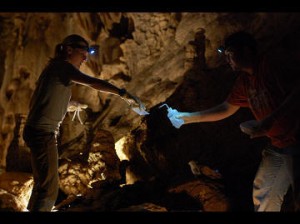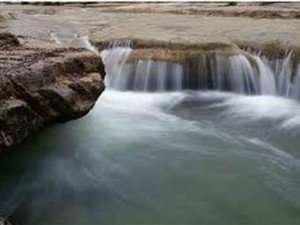Research
Research and Teaching Interests
Jay Banner‘s research and teaching interests center on Earth surface processes, including climate and hydrologic processes, how they are preserved in the geologic record, and how human activity affects the sustainability of water resources. These subjects are explored using a range of approaches that include field studies, petrography, isotope geochemistry, and modeling. Examples of research projects using these approaches are studies of cave deposits (speleothems) as records of the links between climate change and hydrology, and studies of modern aquifers and watersheds in urbanizing environments. These projects are detailed below. Jay is also the leader of Project CRESSLE, which applies geoscience-based participatory research to addressing the challenges of water and climate resilience in local communities.
Research Projects and Opportunities
Our group investigates two main research areas, described below. Opportunities for prospective graduate students are described below and under the ‘Recruiting’ tab here. These areas are part of the larger Jackson School research themes of Climate and the Environment and Surface and Hydrologic Processes.
Paleoclimate and Paleohydrology
 Speleothems are cave calcite deposits that are geographically widespread and contain key information about past hydrologic, geomorphic and climate conditions. Records of past conditions are being reconstructed through studies of speleothems and tree rings in Texas, and through studies of speleothems in the Western Pacific region, the Bahamas, and Barbados. One emphasis of this research is the rigorous assessment of ancient signals recorded by speleothems through monitoring experiments in active caves.
Speleothems are cave calcite deposits that are geographically widespread and contain key information about past hydrologic, geomorphic and climate conditions. Records of past conditions are being reconstructed through studies of speleothems and tree rings in Texas, and through studies of speleothems in the Western Pacific region, the Bahamas, and Barbados. One emphasis of this research is the rigorous assessment of ancient signals recorded by speleothems through monitoring experiments in active caves.
Impacts of urbanization on water resources and sustainable development
 We study the multiple, synergistic impacts of urban development on processes of groundwater and surface water evolution, and sustainable use of water resources. Field, geochemical (stable and radiogenic isotopes, trace elements), and modeling approaches are applied to central Texas watersheds to understand the challenges to water and climate resilience to help inform sustainable development of local communities. Temporal changes in these processes are investigated through geochemical analysis of tree-rings and travertine growth layers.
We study the multiple, synergistic impacts of urban development on processes of groundwater and surface water evolution, and sustainable use of water resources. Field, geochemical (stable and radiogenic isotopes, trace elements), and modeling approaches are applied to central Texas watersheds to understand the challenges to water and climate resilience to help inform sustainable development of local communities. Temporal changes in these processes are investigated through geochemical analysis of tree-rings and travertine growth layers.
Research Experience for Undergraduates
The Research Experience for Undergraduates in Integrated Environmental Science gives undergraduate students the opportunity to conduct research into The Science of Global Change and Sustainability. Participants spend ten weeks designing a research project, participating in a research group, and presenting their work. This program is funded by the National Science Foundation.
Analytical Facilities
Isotope Clean Lab (Lab Manager: Dr. Staci Loewy)
Mass spectrometers (Lab Manager: Dr. Staci Loewy)

